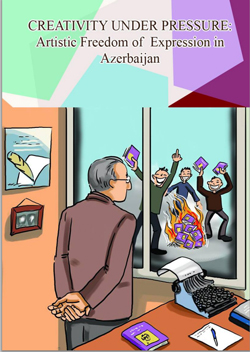27 May 2014 | Azerbaijan, Azerbaijan News, Politics and Society
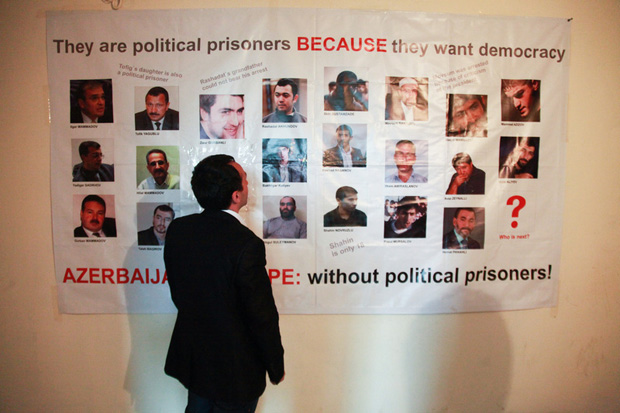
(Image: Aziz Karimov)
An Azerbaijani journalist and blogger has been sentenced to five and a half years imprisonment after publishing posts deemed critical of the authorities on Facebook. Abdul Abilov, who runs the Facebook page “Stop sycophants!” was charged with illegal possession, storage, manufacturing or sale of drugs at the Baku Serious Crimes Court. The social media page was closed down shortly after his arrest.
Emin Huseynov, chairman of the Institute for Reporters’ Freedom and Safety (IRFS), is deeply concerned by the sentencing of journalists and bloggers in Azerbaijan, especially as the country has recently been handed chairmanship of the Committee of Ministers for the Council of Europe, a post Azerbaijan will hold for the next six months.
“Today’s harsh conviction shows once again the extraordinary measures that authorities are willing to take to crush criticism of their repressive policies, inconsistent with the country’s chairmanship of the Council of Europe,” Huseynov said in a statement. The IRFS has also called on the Council to “immediately appoint a special rapporteur on political prisoners in Azerbaijan” to analyse the situation in the country as well as raising the issue to the Parliamentary Assembly.
Abilov joins the eight journalist and seven bloggers and online activists already serving time in jail in the country for politically-motivated convictions, including the recent sentencing of the independent newspaper website editor Parviz Hashimli. And it’s not just journalists who are coming under fire from the authorities. Early May saw the sentencing of eight young activists on charges of attending to “cause public disorder”.
This article was posted on May 27, 2014 at indexoncensorship.org
12 May 2014 | Azerbaijan, Azerbaijan News, Campaigns
As Azerbaijan is about to assume the Chairmanship of the Council of Europe Committee of Ministers, a new report details cases of violations of the right to artistic freedom of expression over the past three years in the country.
According to the report, the Azerbaijani authorities have used a range of tactics to silence critical artistic expression, including harassment, intimidation, threats, interference, legal pressure, arrest, imprisonment, and torture.
The report, Creativity Under Pressure: Artistic Freedom of Expression in Azerbaijan, is published by the Baku-based Art for Democracy campaign. Art for Democracy is a campaign that uses art to promote democracy and human rights in Azerbaijan. The group has faced significant pressure since its launch in December 2012, including the attempted launch event for this very report, which has been cancelled by three hotels in Baku.
Index on Censorship is posting the report on its website as Art for Democracy’s new website, www.artfordemocracy.net, has faced a hack attack shortly after being live and is not currently functioning.
Executive Summary
Creativity Under Pressure: Artistic Freedom of Expression in Azerbaijan (PDF) is a report of the Art for Democracy campaign, which uses all forms of artistic expression to promote democracy and human rights in Azerbaijan. The report examines the situation of artistic freedom of expression in Azerbaijan from 2011 to the time of publication, April 2014.
Despite the fact that Azerbaijan has committed to respect and protect the right to artistic freedom of expression, in practice, the Azerbaijani authorities restrict this right, particularly with regard to alternative artists and artists considered to be critical of the government. The ability of these artists to perform, display, or disseminate their work is limited through direct and indirect means. As a result, few artists remain willing to publicly express critical views or use their work to explore controversial themes, and those who do face serious consequences.
The report is divided into three chapters. The first chapter sets out international standards for artistic freedom of expression, which Azerbaijan has committed to protect and respect through its membership in a number of international organizations and its ratification of or accession to international treaties.
The second chapter covers the domestic legal framework for artistic freedom of expression. Azerbaijani legislation largely conforms to international standards for artistic freedom of expression; however, many of these laws allow for state interference, which could be used as means of censoring artistic expression. Further, the continued presence of criminal defamation provisions in Azerbaijani legislation contradicts international standards and has a chilling effect on freedom of expression, contributing to widespread practices of self-censorship in the country, including in the arts.
The third chapter examines freedom of artistic expression in practice in Azerbaijan, detailing cases of pressure on musicians; film, television, and theater workers; writers, poets, and publishers; human rights defenders who campaign for the right to artistic freedom of expression or who use artistic forms of expression to draw attention to the human rights situation in Azerbaijan; and political activists who use creative means of expressing critical political views.
In publishing this report, the Art for Democracy campaign hopes to draw greater awareness, both within Azerbaijan and at the international level, to ongoing restrictions of the right to artistic freedom of expression in Azerbaijan, and in that regard, to improve the situation in the country.
To that end, the report contains a number of recommendations to the Azerbaijani authorities for concrete steps needed to improve the situation of artistic freedom of expression in the country. Among these are the need to cease politically motivated arrests of persons in connection with their exercise of the right to artistic freedom of expression; to conduct serious and independent investigations into reports of torture and calls for violence against artists; to cease practices of censorship and dismissal of artists working for state bodies; to cease practices of discriminatory treatment of critical and alternative artists; and to decriminalize defamation.
Read the full report here (PDF)
This article was published on May 12, 2014 at indexoncensorship.org
8 May 2014 | Azerbaijan, Azerbaijan News, Europe and Central Asia, News
This week eight young Azerbaijani activists were sentenced to between six and eight years in jail. The members of the N!DA Youth Movement, which works for democracy and social change, were convicted for possession of drugs and explosives, and for intending to “cause public disorder”. The charges are widely believed to be trumped up, and the trials have been criticised by foreign observers over “irregularities” and “shortcomings”, including inconsistencies in testimonies and mishandling of evidence.
This is just the latest addition to a long list of human rights abuses by authorities in the oil rich country. As the repression has largely been allowed to take place away from international attention, this is a good moment to remember a few things about Azerbaijan, especially as the country prepares to take over a six month chairmanship of the Council of Europe’s Committee of Ministers.
1) The six are far from the only political prisoners in Azerbaijan

(Image: Aziz Karimov)
According to the latest figures, there are 142 political prisoners in Azerbaijan today. These include human rights defenders, youth activists, and a large number of religious activists, among others. There are currently 17 people serving life sentences. Ahead of the country’s presidential election last October, candidate Ilgar Mammadov was arrested. In March, he was sentenced to seven years in prison for “organizing mass disturbances” and “resisting the police”. Meanwhile, President Ilham Aliyev insists that there are no political prisoners in Azerbaijan.
2) You may escape imprisonment, but you could still face violence and intimidation
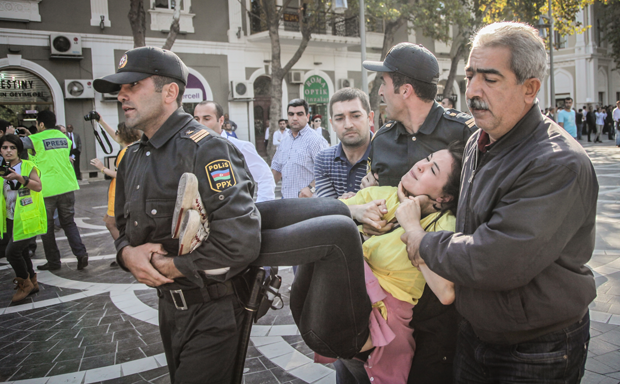
(Image: Aziz Karimov)
Attacks, threats and intimidation are regular occurrences for political opponents, activists and press in Azerbaijan. Following protests in the capital Baku as Aliyev secured his third consecutive term in power last October, demonstrators were beaten and detained by police. Police also raided the offices of independent Election Monitoring and Democracy Studies Centre (EMDSC) which reported irregularities in the election. In 2012, reporter Idrak Abbasov was brutally beaten when filming the demolition of a house by the State Oil Company of Azerbaijan, allegedly by employees of the company and police. The same year, fellow journalist Khadija Ismayilova, known for covering corruption among the country’s powerful elite, was blackmailed with intimate images of her and her boyfriend. She continues to face intimidation today. These abuses are often allowed to happen with impunity.
3) Independent and critical media are under threat

(Image: Alex Brenner for Index on Censorship)
Azerbaijan’s critical press have long been subjected to an array of attacks. Independent news outlets face economic sanctions, and are often barred from distribution networks. Some 70% of distribution is controlled by the government. Most of the nine national TV channels are either directly owned by the state or controlled by the authorities. Journalists also fall victim to legal threats. In the first six months of 2013, 36 defamation suits were brought against media outlets or journalists, four of which were criminal defamation suits. One victim of this hugely restrictive media environment is leading independent paper and Index Award winner Azadliq. The paper has been hit with £52,000 worth of fines following defamation suits, state-owned press distribution company Gasid has not been transferring payments that reflect the paper’s sales. Azadliq claims Gasid owe them some £44,000.
4) Authorities are on an ongoing PR mission
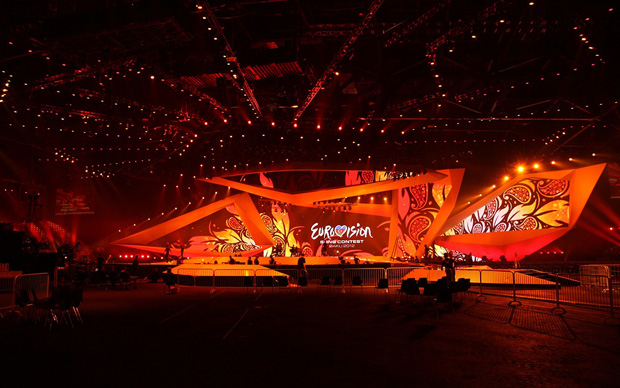
(Image: Zeljko Joksimovic/Wikimedia Commons)
While the situation inside the country shifts between bad and worse, authorities have focused their attentions on a wide-reaching international PR campaign. Ahead of hosting the Eurovision Song Contest, authorities ordered urban renewal that saw houses demolished and families evicted. Vast sums have in recent years been poured into the radical regeneration and beautification of Baku, and there’s more to come. There is also the posh London bar Baku, owned by the Aliyevs; the glossy, internationally distributed Baku magazine, edited by first daughter Leyla and co-published by Conde Nast; and the sponsorship deal with Champions League finalists Atlético Madrid. Next year, Baku will again play host to a prestigious international event — the inaugural European Games.
5) They are about to take charge of one of Europe’s most important human rights bodies
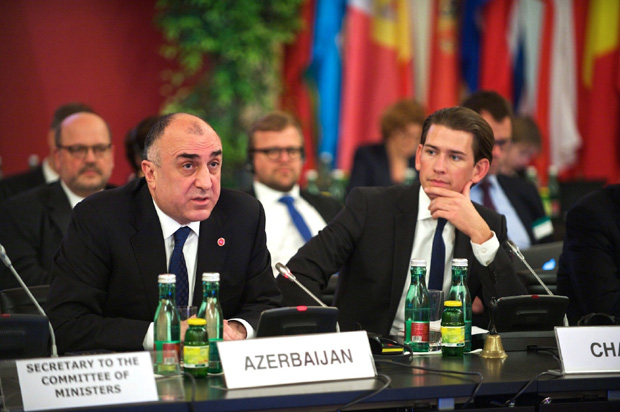
(Image: Sandro Weltin/Council of Europe)
“The Committee of Ministers supervises the execution of judgments of the European Court of Human Rights the Council of Europe…The Committee of Ministers’ essential function is to ensure that member states comply with the judgments and certain decisions of the European Court of Human Rights,” the Council of Europe declare on their website. Next week Azerbaijan will assume the chairmanship of this very Committee of Ministers. But one could say that COE is only sticking to form in its relationship with the country. Only last year, a majority in its Parliamentary Assembly (PACE) voted down a resolution on the existence of political prisoners in Azerbaijan.
This article was originally published on 8 May 2014 at indexoncensorship.org
1 May 2014 | Azerbaijan, Azerbaijan News, Europe and Central Asia, News

Striker Diego Costa during the first leg of Atlético Madrid’s Champions League semi-final against Chelsea (Image: Gonzalez Fuentes Oscar/Demotix)
Atlético Madrid are the toast of world football fans at the moment. They’re having possibly their greatest season ever, qualifying for the Champions’ League Final and looking set to break the Barcelona/Real Madrid duopoly over Spain’s La Liga.
Sports fans love nothing more than an underdog story, and the Atlético one feels just right. Always the less glamorous team in the Spanish capital, they’re finally having their time in the sun. Only a complete killjoy would rain on the parade of super striker Diego Costa and his team mates.
So here I go.
Atlético’s shirts bear the advertising slogan “Azerbaijan: Land of Fire”. They are sponsored by the government of Ilham Aliyev, a man who combines the callousness of the classic dictator with the appearance and language of an aspiring sales executive who’s read one too many management manuals. His Twitter page bears the fascinatingly banal phrase: “We turn initiatives into reality.” I have absolutely no idea what that means (suggestions in the comments, please). Whatever it does mean, he’s clearly quite pleased with it, as it pops up regularly on his website.
The deal (sorry, “strategic agreement”) with Atlético came about in December 2012, and was renewed in March 2014.
The explanatory blurb on the Atlético website is packed with more nonsense of the “initiatives into reality” variety.
Atlético is not a football club, it is a “sports entity”.
“The link between Azerbaijan and Atlético Madrid,” we are told, “is much more than a traditional commercial sponsorship associated with a shirt sponsorship, because it has atremendous value, as the tool to achieve important goals, through actions of a different nature, sports, commercial, communication, marketing and corporate social responsibility for the benefit of all parties.”
This is almost poetic in its nonsense; in fact the “actions of a different nature, sports, commercial, communication, marketing and corporate social responsibility for the benefit of all parties” brings to mind no less literary masterpiece than Lucky’s monologue in Samuel Beckett’s Waiting for Godot: “…the practice of sports such as tennis football running cycling swimming flying floating riding gliding conating camogie skating tennis of all kinds…”
All this would merely be amusing if Aliyev was, say, head of a fleet car dealership in Runcorn. Unfortunately, he’s not. He’s the autocratic head of a regime bloated on oil and gas revenue that is engaged in an enormous whitewashing exercise composed of equal parts propaganda and censorship.
The propaganda part can be quite amusing: the Knightsbride nightclub called Baku, after Azerbaijan’s capital; the glossy magazine, also called Baku; the shiny skyscrapers; the on-message Eurovision Song Contest entry (Start A Fire, sung by Dilara Kazimova).
The censorship bit is rather less fun, as a search on the Index on Censorship website will quickly reveal.
There is the case of journalist Khadija Islamova, harassed and blackmailed by the authorities; Index on Censorship award winning newspaper Azadliq, threatened with financial ruin deliberately brought about by state agencies; Idrak Abbasov, brutally assaulted for daring to report on demolitions of houses by the state oil company. There is also Rafiq Tagi, a murdered columnist whose killer has never been brought to justice; dissident “Donkey bloggers” Adnan Hajizade Emin Milli, imprisoned for hooliganism after going to the police to report that they had been assaulted; reporter Eynulla Fatullayev, jailed for four years, and hit with false drug charges; critical journalist Elmar Huseynov, murdered in 2005.
Are these victims of Atlético Madrid? No, it would be unfair to say that. For a start, Atlético are not the only club to benefit from shirt sponsorship from dubious regimes; Barcelona, with their smug “més que un club” image, ditched UNICEF from their jerseys to sign a deal with Qatar, a country that locks up poets, for God’s sake. No one blames Lionel Messi for the fate of Mohammed al-Ajami.
Nonetheless, Azerbaijan’s deal with Atlético is one side of Aliyev and his cronies’ colossal image management exercise; and the imprisonment of critical reporters, bloggers and activists is the other. They cannot be separated entirely.
We should enjoy the football and praise the players, but we owe it to brave determined Azerbaijainis to ask some tough questions of Atlético’s officials, even as they celebrate.
This article was posted on May 1, 2014 at indexoncensorship.org


